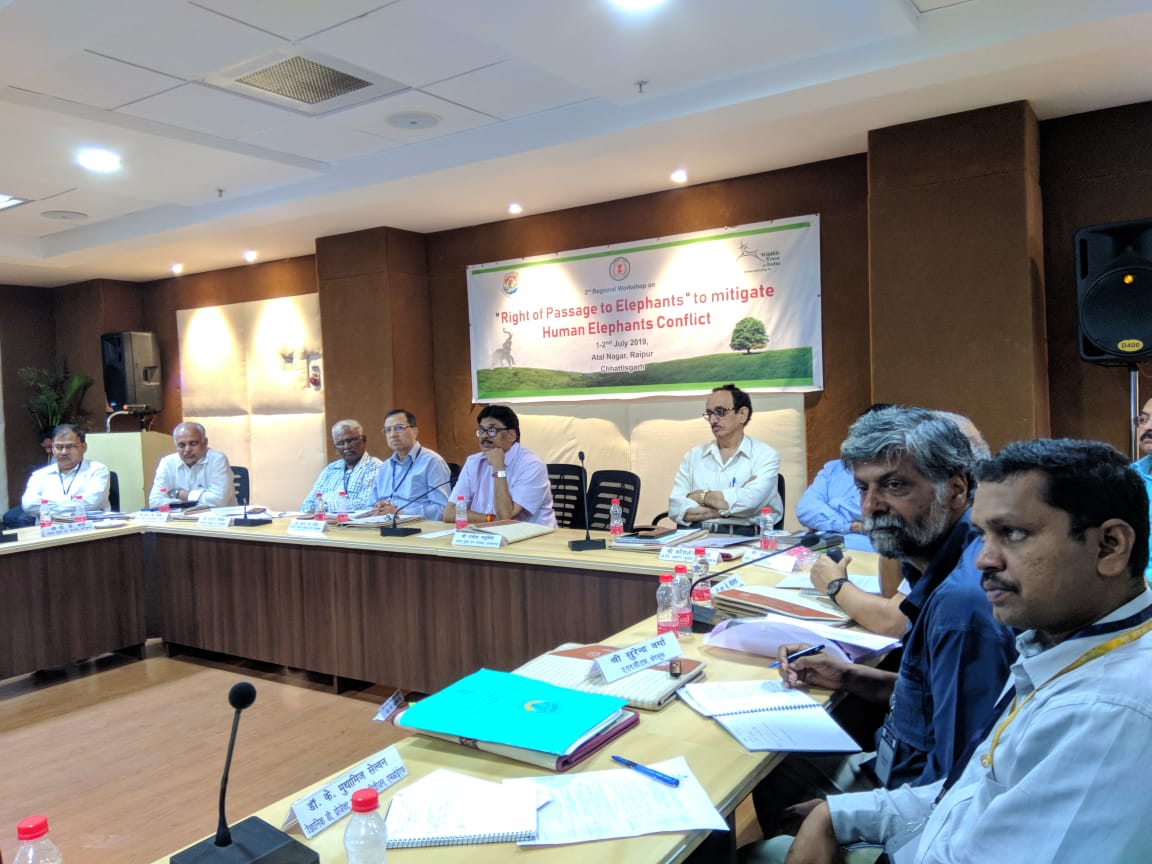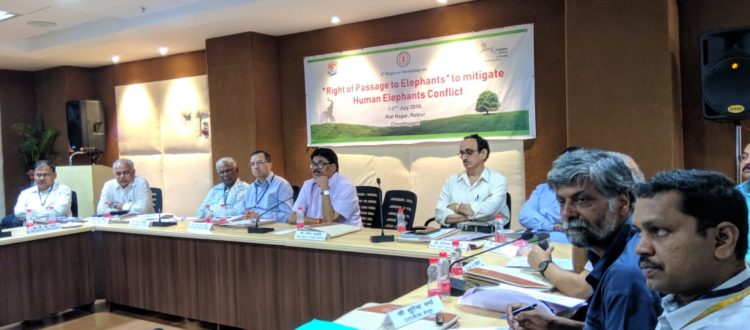Regional Consultative Workshop in the Eastern-Central Landscape on elephant passages and solutions to mitigate Human-Elephant Conflict
Raipur, Chattisgarh, July 18, 2019 : Owing to increased instances of human-elephant conflict, the Ministry of Environment Forests & Climate Change (MoEFCC) in the 14th Steering Committee Meeting of the Project Elephant Division last year, had decided to hold four regional workshops on “Right of Passage to Elephants to mitigate human-elephant conflict. These local level workshops were planned to get people from the forest department and other stakeholders such as line departments (National Highways, Railways, Power and Canal), civil societies and elephant experts under the same ambit. Was planned with an intent to help protect elephant corridors and find measures to mitigate Human-Elephant Conflict.
The first workshop on the subject for the Southern region was held at Thiruvananthapuram on January 2018 and the second regional workshop for North-Eastern region was held in Darjeeling in April 2018. The third regional workshop for the Eastern and Central part in partnership with Wildlife Trust of India (WTI) was held at Raipur, Chhattisgarh on 1st and 2nd July 2019. The workshop involved govt. representatives, civil societies, elephant experts and wildlife organizations from the states of Chhattisgarh, Odisha, Madhya Pradesh, Southern West Bengal, Jharkhand and Bihar.
A total of 3128 odd elephants reside in the Central Indian Landscape comprising of the elephant population from the states of Jharkhand, Orissa, Chhattisgarh and part of Southern West-Bengal. WTI has identified two corridors in Chhattisgarh namely, Surguja- Jashpur and Tamorpingla- Jashpur. Both the corridors suffer from extreme habitat degradation and high incidences of Human-Elephant Conflict owing in no small number of villages present inside in the corridors. Keeping this in mind, the discussion in the workshop in Chhattisgarh primarily focused on ways to mitigate the Human-Elephantnt Conflict (HEC) in the region. In the workshop, issues such as the role of the awareness campaign on sensitizing local communities, an overview of the current status of elephant corridors in the six Eastern and Central Indian states and role of Civil Societies in assisting Forest Departments in securing corridors were highlighted.
It was recommended to adopt an integrated land use planning and development and institutionalize cross-sectoral cooperation in managing HEC. It was emphasized that state governments should take appropriate steps to secure and restore corridors and sustainable funding should be ensured for mitigating Human-Wildlife Conflict. Adoption of various preventive measures such as the installation of suitable barriers, early warning systems, creation of Rapid Response Units (RRTs), conducting capacity building and awareness programmes of local communities and forest staff were suggested. State Forest departments were advised to ensure migratory routes of elephants remain unhindered and hold regular inter – state coordination committee meetings. The decision to constitute a trained specialized force comprising of a manager, biologist and veterinarian were taken to address the conflict situations arising in the area immediately.
The closing ceremony was chaired by Mr Mohammad Akbar, Hon’ble Forest Minister of Chhattisgarh Govt. Mr Akbar declared that the State Govt. is making attempts to declare Lemru Wildlife Sanctuary as an Elephant Reserve to protect elephants.

WTI had also participated in the Second Meeting of Central Project Elephant Monitoring Committee (CPEMC) held on 29th and 30th June, 2019. The meeting was planned to evaluate the conflict situation in Surguja and Surajpur Divisions of Chhattisgarh. Visits to elephant rescue center in Tamor Pingla Sanctuary, Archaka village, Mainpat and Kandaraja villages were also made to assess the magnitude of Human- Elephant conflict and to ensure that movement of elephants through corridors is not hindered.
Securing, maintaining and managing elephant corridors in India has been one of the main priorities of WTI. As an initial step in securing the corridors, WTI identified all the corridors in the country and published it in the form of a manuscript titled ‘Right of Passage: Elephant Corridors of India’ in 2005. An updated version of the document containing all the new threats and recent developments in the corridor regions also came up in 2017. WTI along with its supporters has been working with different State Forest Departments and local communities to secure the corridors. We are putting our best efforts to ensure long-term conservation of the threatened Asian Elephant in the Indian landscape.









